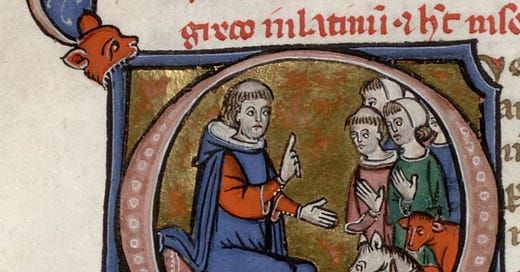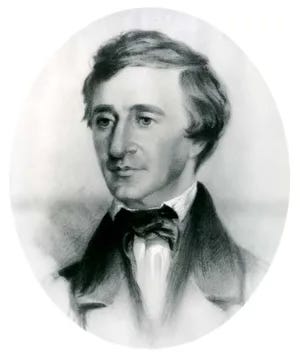Hi! This week I uploaded the very short and somewhat frustrated third part of my reading of Ezra Pound’s Cantos. The next one should be more interesting and less annoyed. For now, some notes on Thoreau and Aristotle, and a memoirish mini essay about the pandemic.
Over the last week I've been rereading the logical works of Aristotle, the content of which had managed to escape from me somewhat over the few years since last I read them. Aristotle unfortunately inaugurates the now-venerable tradition by which philosophers are masters of tedium, although in his defense what we have now from him are more like lecture notes than actual completed works. I've read the Nichomachean Ethics and the Politics recently, and at some point I'll probably get around to reading (all of this is in translation as I am the child of a low and degenerate age, and made the mistake of not spending my youth studying greek adn latin) Aquinas' commentaries on the same. I'm discovering the familiarity is a help, although it's still not totally clear what he's on about sometimes. I have a certain skepticism- I have a problem with closed circles, and thus the more totalizing ambitions of Thomism and Aristotelianism are probably not for me. It strikes me that this is a *profoundly* protestant attitude, but it's the one I've been bequeathed by culture and temperament. That the circle must always remain incomplete despite the frustrations of intellectuals and churchmen is a deep commitment on my part, and the avenues of thought I find interesting I often find compelling because they seem to me to offer some hit of a way to square the circle. This is of course an *extremely* American way of thinking, to imagine that there must necessarily be an exception on our behalf to the laws of history and culture, some way in which we are those anointed by God. In this too I am faithful to what I have been bequeathed by culture and temperament.
Transcendentalist wanderings: inadequate reflections on Thoreau
On that note I've been reading the LOA collection of Henry David Thoreau over the last week as well, not Walden yet though, which I believe I read with nearly everyone else in school, particularly as the transcendentalists belonged to our commonwealth, even if I was raised on the other side, in the unloved stepchild of internal regions of Massachusetts. Concord is a day trip away, even if it's also one I've never made.
Nowadays almost all man’s improvements, so called, as the building of houses, and the cutting down of forests and of all large trees, simply deform the landscape, and make it more and more tame and cheap. A people who would begin by burning the fences and let the forest stand! I saw the fences half consumed, their ends lost in the middle of the prairie, and some worldly miser with a surveyor looking after his bounds, while heaven had taken place around him, and he did not see the angels going to and fro, but was looking for an old post-hole in the midst of paradise. I looked again, and saw him standing in the middle of a boggy, stygian fen, surrounded by devils, and he had found his bounds without a doubt, three little stones, where a stake had been driven, and looking nearer, I saw that the Prince of Darkness was his surveyor.
I'm not sure if this is subliminal second-hand influence by Michael West or mental contamination from reading too much Nietzsche too quickly, but Thoreau is seeming much closer on this read to the sort of masculinist thinkers the latter part of his century was lousy with than the gentle nature-loving hippie which modern American culture tends to regard him as. He is characteristically American in the sense that while this is true, he is not a peddler of any "billions must die" mantra. This isn't to say that there can’t be a dark side to Transcendentalism-at least in potentia: Herman Melville has a wickedly funny and perhaps not entirely fair passage in the Confidence-Man about Emerson and Thoreau which I have often thought about.1
"Why?"
"Because my rule forbids. I give away money, but never loan it; and of course the man who calls himself my friend is above receiving alms. The negotiation of a loan is a business transaction. And I will transact no business with a friend. What a friend is, he is socially and intellectually; and I rate social and intellectual friendship too high to degrade it on either side into a pecuniary make-shift. To be sure there are, and I have, what is called business friends; that is, commercial acquaintances, very convenient persons. But I draw a red-ink line between them and my friends in the true sense—my friends social and intellectual. In brief, a true friend has nothing to do with loans; he should have a soul above loans. Loans are such unfriendly accommodations as are to be had from the soulless corporation of a bank, by giving the regular security and paying the regular discount."
"An unfriendly accommodation? Do those words go together handsomely?"
"Like the poor farmer's team, of an old man and a cow-not handsomely, but to the purpose. Look, Frank, a loan of money on interest is a sale of money on credit. To sell a thing on credit may be an accommodation, but where is the friendliness?
The national strengths can be the national deficits: a certain over-individualism, a certain oscillating over-hostility or overly sentimental attitude to nature that passes down from the puritans.2 The positives are not to be ignored, however. I’m struggling to get the words out, but I think what’s valuable to me in the transcendentalists right now is their optimism, their exuberance. I’ve been reading a group of thinkers who are as a body fairly down on modernity, and it’s good to read a group of brilliant American thinkers who dissent through the ages from all that gloom.
Dog breath in the year of the plague: my pandemic
I've been thinking, as I think everyone else has, of the days five years ago when the world ended temporarily. I was between jobs at the time and living at home with my mother and younger brother, looking for work but not having much luck finding any. Ironically given the extent to which this became a position of the right and that as was the case for many I was the farthest left I have ever been in 2020, I was initially somewhat dismissive of covid, largely in the spirit of Nothing Ever Happens, but my mother, whose boss was battling cancer at the time was much more convinced that it would be serious. In the end she was proved correct, and the world shut down.
In somewhat the way Thoreau has sometimes been accused in our time of underplaying his dependence on others, of coming across as more of a man of the woods than he really was, I want to be careful here not to overplay the way in which for all the chaos and uncertainty that period was for me one of solidarity and belonging, of having a social function and performing it as best one could. I recognize in those memories a smaller scale version of the perverse cultural nostalgia for the worst days of the Second World War that one encounters in the English (and to a lesser extent the other allies.) It must be said that we were very lucky, to have the house paid for, to have two of the three essential workers, for my being able to cook and clean for the others, etc. Still, one did go a little stir crazy. I would drive down to the cemetery where about a third of my dad's family are buried to just get out of the house for the hour and change it took' to get down there and back, just to feel connected to a time before and presumably a time after. A lot of day drinking took place, etc.
Eventually the seasonal retail job (which was for whatever reason deemed agricultural and thus essential)I'd been workouts since I was a teen opened up, and I was putting in the most hours I have ever worked for pay before or since. Because people wanted something to do we were inundated all day every day, and thus my pandemic ended. I did other things that year, had other jobs. I worked for the census for a while, which was a deeply surreal experience, but that's not really the story I was interested in telling today. As I've written before, Covid was an enormously epistemically shattering event, and remains so even half a decade later. I know people who think we should still be in lockdown, and I also know people who think the lockdowns were a miscarraige of justice on the level of the Iraq war, a kind of borderline-totalitarian coup conducted by the left professional manegerial class against the rest of the world for the purpose of instituting an agenda that could never be acheived by democratic means. It's a huge mess that shows no signs of ever healing, and maybe can’t.
Now that’s a book I need to get around to writing a review of someday. I tend to read it with a certain messianic ambivalence about the identity of the titular character which leavens the undeniable bitterness of the text and redeems (or something like it at least) what might otherwise be a very nihilistic satire. Melville being who he was, either possibility is an option.
Although Emerson can be a little over-optimistic about nature, which Melville also lampoons quite effectively in The Confidence-Man.






Concord might be worth the trip, as much for Emerson's old houses and the battle memorials as for Thoreau's. If you haven't checked it out, I found Gross's The Transcendentalists and Their World was great for background for their place and time, but my interests may have been different: I was interested in that later masculinism and Self-Culture and broader self-help ideologies. I was following up some questions I had about Teddy Roosevelt's rough treatment of his brother Elliott, Eleanor's father, and implications of that family dynamic for later American elites and elects.